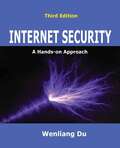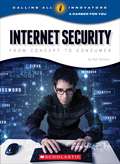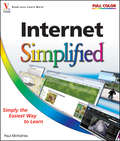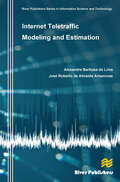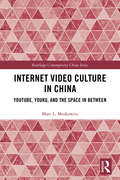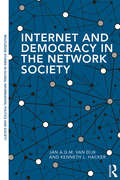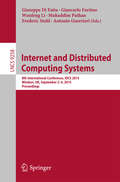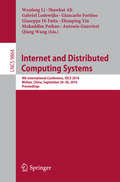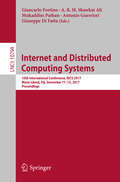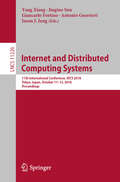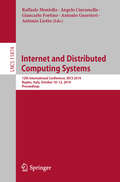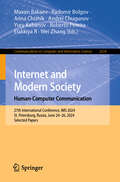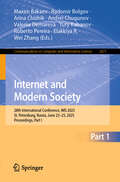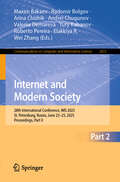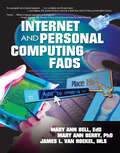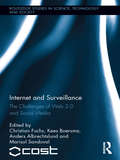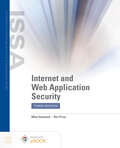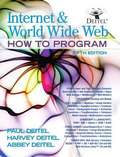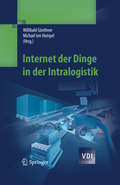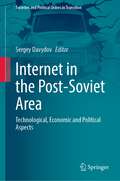- Table View
- List View
Internet Security: A Hands-on Approach
by Wenliang DuTeaching Internet security principles via hands-on activities. <p><p>Unique among computer security texts, this book, in its third edition, builds on the author’s long tradition of teaching complex subjects through a hands-on approach. For each security principle, the book uses a series of hands-on activities to help explain the principle. Readers can touch, play with, and experiment with the principle, instead of just reading about it. The hands-on activities are based on the author's widely adopted SEED Labs, which have been used by over 1000 institutes worldwide. The author has also published online courses on Udemy based on this book.
Internet Security: From Concept to Consumer (Calling All Innovators: A Career for You)
by Nel YomtovLearn about the history of internet security and find out what it takes to make it in this exciting career field.
Internet Simplified
by Paul McfedriesThe content boom on the Internet has been explosive in the past few years with more than a billion people surfing worldwide. Internet Simplified shows beginning level computer users how to get comfortable surfing the web and how to navigate the flood of information once they find what they're looking for. Users will find helpful information on the most talked about newcomers to the online world such as social networking sites like Facebook and MySpace, blogging, and downloading media content from YouTube and iTunes, as well as an introduction to the old standbys such as email, auction sites, and instruction for safe surfing. Coverage on how to safeguard against viruses and SPAM and keep computers free from unwanted visitors is approached in a gentle, user-friendly manner so anyone can apply the techniques and be free from troublesome intrusions. Full-color screen shots and numbered, step-by-step instructions guide readers through the intricacies of navigating the web in a friendly, approachable way. The updated design features a more sophisticated look and larger fonts and images to make this a perfect reference for all ages.
Internet Spaceships Are Serious Business: An EVE Online Reader
by Marcus Carter Kelly Bergstrom Darryl WoodfordEVE Online is a socially complex, science-fiction-themed universe simulation and massively multiplayer online game (MMOG) first released in 2003. Notorious for its colossal battles and ruthless player culture, it has hundreds of thousands of players today. In this fascinating book, scholars, players, and EVE&’s developer (CCP Games) examine the intricate world of EVEOnline--providing authentic accounts of lived experience within a game with more than a decade of history and millions of &“real&” dollars behind it.Internet Spaceships Are Serious Business features contributions from outstanding EVE Online players, such as The Mittani, an infamous member of the game&’s community, as well as academics from around the globe. They cover a wide range of subjects: the game&’s technicalities and its difficulty; its projection of humanity&’s future in space; the configuration of its unique, single-server game world; the global nature of warfare in its &“nullsec&” territory (and how EVE players have formed a global concept of time); stereotypes of Russian players; espionage play; in-game memorials to Vile Rat (aka U.S. State Department official Sean Smith, murdered in the 2012 Benghazi attack); its gendered playing experience; and CCP Games&’ relationship with players; and its history and legacy.Internet Spaceships Are Serious Business is a must for EVE Online players interested in a broad perspective on their all-consuming game. It is also accessible to scholars, game designers seeking to understand and replicate the successful aspects unique to EVE Online, and even those who have never played this notoriously complex game.Contributors: William Sims Bainbridge, National Science Foundation; Chribba; Jedrzej Czarnota; Kjartan Pierre Emilsson; Dan Erdman; Rebecca Fraimow; Martin R. Gibbs, U of Melbourne; Catherine Goodfellow; Kathryn Gronsbell; Keith Harrison; Kristin MacDonough; Mantou (Zhang Yuzhou); Oskar Milik; The Mittani (Alexander Gianturco); Joji Mori; Richard Page; Christopher Paul, Seattle U; Erica Titkemeyer, U of North Carolina at Chapel Hill; Nick Webber, Birmingham City U.
Internet Teletraffic Modeling and Estimation (River Publishers Series In Information Science And Technology Ser.)
by Alexandre Barbosa de Lima Jose Roberto AmazonasNetwork traffic has fractal properties such as impulsiveness, selfsimilarity, and long-range dependence over several time scales, from milliseconds to minutes. These features have motivated the development of new traffic models and traffic control algorithms. This book presents a new statespace model for Internet traffic, which is based on a finite-dimensional representation of the Autoregressive Fractionally Integrated Moving Average (ARFIMA) random process. The modeling via Autoregressive (AR) processes is also investigated.
Internet Transport Economics (Synthesis Lectures on Learning, Networks, and Algorithms)
by Richard T. MaThis book presents Internet transport economics as a new approach to understanding the packet-switching paradigm of Internet infrastructure as a global transport system for data packets. It is a prescient view of the Internet’s evolution into a content-centric service platform where the quality of services (QoS) cannot be guaranteed due to the tens of thousands of autonomous systems that enact business decisions on peering, routing, and pricing in a way that determines aspects of the Internet ecosystem like network topology, latency and throughput of traffic flows, and performance of network applications. The trafficking issues created in this environment are a critical concern and barrier for user applications that require real-time responses, such as telesurgery and teleoperation of autonomous vehicles, and the book presents the Internet transport economics model as the solution. While engineering and business are the prevailing lenses through which the Internet is viewed, the book builds its methodological framework around transport. Further delving into economics, it establishes how the Internet can be understood as providing transport services for data packets, whose demand and supply are driven by the QoS metrics of delay and loss, which can be regarded as congestion costs that result in equilibrium rates of traffic flows sent by content providers (CPs). The book goes on to present a stylized model of content provider-to-access provider (CP–AP) service as well as congestion equilibrium and rate equilibrium solution concepts under the Internet transport economics framework. These are used to analyze the problem domains of service differentiation, market structure, and data pricing. Finally, it discusses various potential future applications. This book will be of interest to graduate students and researchers in areas of computer networking and performance evaluation.
Internet Video Culture in China: YouTube, Youku, and the Space in Between (Routledge Contemporary China Series)
by Marc L MoskowitzExamining Internet culture in the People’s Republic of China, Taiwan, Hong Kong, and the US, this book analyzes videos which entertain both English and Chinese-speaking viewers to gain a better understanding of cultural similarities and differences. Each of the chapters in the volume studies streaming videos from YouTube and its Chinese counterparts, Todou and Youku, with the book using a combination of interpretative analysis of content, commentary, and ethnographic interviews. Employing a diverse range of examples, from Michael Jackson musical mash-ups of Cultural Revolution visuals, to short clips of Hitler ranting about twenty-first century issues with Chinese subtitles, this book goes on to explore the ways in which traditional beliefs regarding gender, romance, religion, and politics intersect. Looking at how these issues have changed over the years in response to new technologies and political economies, it also demonstrates how they engage in regional, transnational, and global dialogues. Comparing and incorporating the production of videos with traditional media, such as television and cinema, Internet Video Culture in China will be useful to students and scholars of Internet and digital anthropology, as well as Cultural Studies and Chinese Studies more generally.
Internet and Democracy in the Network Society (Routledge Studies in Global Information, Politics and Society)
by Kenneth L. Hacker Jan A.G.M. van DijkA seminal shift has taken place in the relationship between Internet usage and politics. At the turn of the century, it was presumed that digital communication would produce many positive political effects like improvements to political information retrieval, support for public debate and community formation or even enhancements in citizen participation in political decision-making. While there have been positive effects, negative effects have also occurred including fake news and other political disinformation, social media appropriation by terrorists and extremists, ‘echo-chambers’ and "filter bubbles", elections influenced by hostile hackers and campaign manipulation by micro-targeting marketing. It is time for critical re-evaluation. Designed to encourage critical thinking on the part of the student, internationally recognized experts, Jan A.G.M. van Dijk and Kenneth Hacker, chronicle the political significance of new communication technologies for the promotion of democracy over the last two decades. Drawing upon structuration theory and network theory and real-world case studies from across the globe, the book is logically structured around the following topics: Political Participation and Inclusion Habermas and the Reconstruction of Public Space Media and Democracy in Authoritarian States Democracy and the Internet in China E-government and democracy Views of democracy and Internet use Underpinned by up-to-date literature, this important textbook is aimed at students and scholars of communication studies, political science, sociology, political communication, and international relations.
Internet and Distributed Computing Systems
by Mukaddim Pathan Antonio Guerrieri Giancarlo Fortino Giuseppe Di Fatta Wenfeng Li Frederic StahlThis book constitutes the refereed proceedings of the 8th International Conference on Internet and Distributed Computing Systems, IDCS 2015, held in Windsor, UK, in September 2015. The 19 revised full and 6 revised short papers presented were carefully reviewed and selected from 42 submissions. The selected contributions covered cutting-edge aspects of Cloud Computing and Internet of Things, sensor networks, parallel and distributed computing, advanced networking, smart cities and smart buildings, Big Data and social networks.
Internet and Distributed Computing Systems
by Mukaddim Pathan Antonio Guerrieri Giancarlo Fortino Giuseppe Di Fatta Wenfeng Li Qiang Wang Shawkat Ali Gabriel Lodewijks Zhouping YinThis book constitutes the refereed proceedings of the 8th International Conference on Internet and Distributed Computing Systems, IDCS 2015, held in Windsor, UK, in September 2015. The 19 revised full and 6 revised short papers presented were carefully reviewed and selected from 42 submissions. The selected contributions covered cutting-edge aspects of Cloud Computing and Internet of Things, sensor networks, parallel and distributed computing, advanced networking, smart cities and smart buildings, Big Data and social networks.
Internet and Distributed Computing Systems: 10th International Conference, IDCS 2017, Mana Island, Fiji, December 11-13, 2017, Proceedings (Lecture Notes in Computer Science #10794)
by Mukaddim Pathan Antonio Guerrieri Giancarlo Fortino Giuseppe Di Fatta A.B.M. Shawkat AliThis book constitutes the proceedings of the 10th International Conference on Internet and Distributed Computing Systems, IDCS 2017, held in Mana Island, Fiji, in December 2017.The 16 full papers presented were carefully reviewed and selected from 40 submissions. The papers focus on emerging models, paradigms, technologies and novel applications related to Internet-based distributed systems, including Internet of Things, cyber-physical systems, wireless sensor networks, next-generation collaborative systems, extreme-scale networked systems, and cloud-based big data systems.
Internet and Distributed Computing Systems: 11th International Conference, IDCS 2018, Tokyo, Japan, October 11–13, 2018, Proceedings (Lecture Notes in Computer Science #11226)
by Yang Xiang Jason J. Jung Antonio Guerrieri Giancarlo Fortino Jingtao SunThis book constitutes the proceedings of the 11th International Conference on Internet and Distributed Computing Systems, IDCS 2018, held in Tokyo, Japan, in October 2018. The 21 full papers presented together with 5 poster and 2 short papers in this volume were carefully reviewed and selected from 40 submissions. This conference desired to look for inspiration in diverse areas (e.g., infrastructure and system design, software development, big data, control theory, artificial intelligence, IoT, self-adaptation, emerging models, paradigms, applications and technologies related to Internet-based distributed systems) to develop new ways to design and mange such complex and adaptive computation resources.
Internet and Distributed Computing Systems: 12th International Conference, IDCS 2019, Naples, Italy, October 10–12, 2019, Proceedings (Lecture Notes in Computer Science #11874)
by Antonio Guerrieri Giancarlo Fortino Antonio Liotta Raffaele Montella Angelo CiaramellaThis book constitutes the proceedings of the 12th International Conference on Internet and Distributed Systems held in Naples, Italy, in October 2019. The 47 revised full papers presented were carefully reviewed and selected from 145 submissions. This conference desires to look for inspiration in diverse areas (e.g. infrastructure & system design, software development, big data, control theory, artificial intelligence, IoT, self-adaptation, emerging models, paradigms, applications and technologies related to Internet-based distributed systems) to develop new ways to design and manage such complex and adaptive computation resources.
Internet and Modern Society. Human-Computer Communication: 27th International Conference, IMS 2024, St. Petersburg, Russia, June 24–26, 2024, Selected Papers (Communications in Computer and Information Science #2534)
by Wei Zhang Radomir Bolgov Yury Kabanov Roberto Pereira Andrei Chugunov Maxim Bakaev Elakkiya R Anna ChizhikThis book constitutes the proceedings of the 27th International Conference on Internet and Modern Society, IMS 2024, held in St. Petersburg, Russia, in June 24–26, 2024. The 29 full papers presented in this book were carefully reviewed and selected from 75 submissions. They are categorized into the following topical sections: • Computational Linguistics (CompLing) • Interactive Systems & Information Society Technologies (InterSys)
Internet and Modern Society: 28th International Conference, IMS 2025, St. Petersburg, Russia, June 23–25, 2025, Proceedings, Part I (Communications in Computer and Information Science #2671)
by Wei Zhang Radomir Bolgov Yury Kabanov Roberto Pereira Andrei Chugunov Maxim Bakaev Elakkiya R. Anna Chizhik Valeriia DemarevaThis two-set volume CCIS 2671 and 2672 book constitutes the proceedings of the 28th International Conference on Internet and Modern Society, IMS 2025, held in St. Petersburg, Russia, during June 23–25, 2025. The 44 full papers and 12 short papers included in these conference proceedings were carefully reviewed and selected from 135 submissions. They are categorized into the following topical sections: Part I: Computational Linguistics & Machine Learning (CompLing); Cyberpsychology & Post-AI Education (PsyAI); Digital Transformation in Governance and Society (DTGS). Part II: Art and Innovation in Museums (AIMs); Interactive Systems & Information Society Technologies (InterSys).
Internet and Modern Society: 28th International Conference, IMS 2025, St. Petersburg, Russia, June 23–25, 2025, Proceedings, Part II (Communications in Computer and Information Science #2672)
by Wei Zhang Radomir Bolgov Yury Kabanov Roberto Pereira Andrei Chugunov Maxim Bakaev Elakkiya R. Anna Chizhik Valeriia DemarevaThis two-set volume CCIS 2671 and 2672 book constitutes the proceedings of the 28th International Conference on Internet and Modern Society, IMS 2025, held in St. Petersburg, Russia, during June 23–25, 2025. The 56 full papers and 12 short papers included in these conference proceedings were carefully reviewed and selected from 104 submissions. They are categorized into the following topical sections: Part I: Computational Linguistics & Machine Learning (CompLing); Cyberpsychology & Post-AI Education (PsyAI); Digital Transformation in Governance and Society (DTGS). Part II: Art and Innovation in Museums; Interactive Systems & Information Society Technologies; Interactive Systems and Technologies in Biomedicine and Psychology; Interactive Systems and Technologies in Education and Humanities
Internet and Personal Computing Fads
by Mary Berry James Van Roekel MaryAnn BellAn easy-to-understand guide to often-confusing computer/Internet jargon! Internet and Personal Computing Fads is an A-to-Z reference book written in a straightforward style that’s informative enough for library use but informal enough for general reading. This essential guide takes a practical look at the most often-seen computer and
Internet and Society: Social Theory in the Information Age (Routledge Research in Information Technology and Society)
by Christian FuchsIn this exceptional study, Christian Fuchs discusses how the internet has transformed the lives of human beings and social relationships in contemporary society. By outlining a social theory of the internet and the information society, he demonstrates how the ecological, economic, political, and cultural systems of contemporary society have been transformed by new ICTs. Fuchs highlights how new forms of cooperation and competition are advanced and supported by the internet in subsystems of society and also discusses opportunities and risks of the information society.
Internet and Surveillance: The Challenges of Web 2.0 and Social Media (Routledge Studies in Science, Technology and Society)
by Christian Fuchs Kees Boersma Marisol Sandoval Anders AlbrechtslundThe Internet has been transformed in the past years from a system primarily oriented on information provision into a medium for communication and community-building. The notion of “Web 2.0”, social software, and social networking sites such as Facebook, Twitter and MySpace have emerged in this context. With such platforms comes the massive provision and storage of personal data that are systematically evaluated, marketed, and used for targeting users with advertising. In a world of global economic competition, economic crisis, and fear of terrorism after 9/11, both corporations and state institutions have a growing interest in accessing this personal data. Here, contributors explore this changing landscape by addressing topics such as commercial data collection by advertising, consumer sites and interactive media; self-disclosure in the social web; surveillance of file-sharers; privacy in the age of the internet; civil watch-surveillance on social networking sites; and networked interactive surveillance in transnational space. This book is a result of a research action launched by the intergovernmental network COST (European Cooperation in Science and Technology).
Internet and Web Application Security
by Mike Harwood Ron PriceInternet and Web Application Security, Third Edition provides an in-depth look at how to secure mobile users as customer-facing information migrates from mainframe computers and application servers to Web-enabled applications. Written by industry experts, this book provides a comprehensive explanation of the evolutionary changes that have occurred in computing, communications, and social networking and discusses how to secure systems against all the risks, threats, and vulnerabilities associated with Web-enabled applications accessible via the internet. Using examples and exercises, this book incorporates hands-on activities to prepare readers to successfully secure Web-enabled applications.
Internet and World Wide Web: How to Program, Fifth Edition
by Paul Deitel Harvey Deitel Abbey DeitelInternet & World Wide Web How to Program, 5/e is appropriate for both introductory and intermediate-level client-side and server-side programming courses. The book is also suitable for professionals who want to update their skills with the latest Internet and web programming technologies. Internet and World Wide Web How to Program, 5e introduces students with little or no programming experience to the exciting world of Web-Based applications. This new edition focuses on HTML5 and the related technologies in its ecosystem, diving into the exciting new features of HTML5, CSS3, the latest edition of JavaScript (ECMAScript 5) and HTML5 canvas. At the heart of the book is the Deitel signature "live-code approach"-concepts are presented in the context of complete working HTML5 documents, CSS3 stylesheets, JavaScript scripts, XML documents, programs and database files, rather than in code snippets. Each complete code example is accompanied by live sample executions. The Deitels focus on popular key technologies that will help readers build Internet- and web-based applications that interact with other applications and with databases. These form the basis of the kinds of enterprise-level, networked applications that are popular in industry today. After mastering the material in this book, readers will be well prepared to build real-world, industrial strength, Web-based applications.
Internet der Dinge in der Intralogistik
by Willibald Günthner Michael Ten HompelExperten aus Wissenschaft und Technik fordern ein Umdenken in der Intralogistik: weg von durchgeplanten, vorherbestimmten Systemen, hin zu einem Netzwerk gleichberechtigter Einheiten, die keiner übergeordneten Koordination bedürfen. In dem Band werden die notwendigen Komponenten, die Softwarearchitektur und die Potenziale dieser neuen Technologie beschrieben. Anwendungsbeispiele liefern Entwicklern und Planern eine Grundlage für die Gestaltung moderner Materialflusssysteme in der Industrie.
Internet for Scientists
by Kevin O'Donnell Larry WingerThis book provides a straightforward manual and review handbook for accessing and using the resources of the Internet in the day to day labours of the working scientist. It addresses the problem of how to cope with an army who have discovered a whole new toy shop full of goodies.
Internet für Senioren für Dummies (Für Dummies)
by Sandra WeberSie wollen mit Ihren Enkeln per Videochat in Kontakt bleiben? Oder auch die Möglichkeit des Onlineversands nutzen? Dann zeigt Ihnen dieses Buch wie Sie in den Weiten des Internet navigieren und welche Dienste Sie nutzen können. Von der Suche nach Informationen über Nachrichtenvermittlung bis zu Onlinebanking. Das Internet kann das Leben erleichtern. Wenn man weiß wie es geht. Mit diesem Buch erhalten Sie leicht verständliche Schritt-für-Schritt-Anleitungen zur Nutzung des Internet.
Internet in the Post-Soviet Area: Technological, Economic and Political Aspects (Societies and Political Orders in Transition)
by Sergey DavydovThis book offers a comparative perspective on the technological, economic, and political aspects of Internet development in the post-Soviet countries. In doing so, international experts analyze similarities and differences in various countries throughout the chapters.The volume consists of two parts. The chapters of the first part examine the post-Soviet area as a whole. The second part includes specific case studies on the development of the Internet, either in individual countries or in groups of countries. Countries analyzed are Estonia, Ukraine, Russia as well as three Central Asian countries: Kazakhstan, Uzbekistan and Tajikistan. Topics covered in the volume include, but are not limited to measurement, dynamics, and structure of each national Internet audience; the history of the Internet in the post-Soviet countries; development of infrastructure; Internet regulation and institutional aspects; online markets such as telecommunications, online advertising, e-commerce, and digital content; social and cultural aspects; as well as the transformation of the national media systems. This book is a must-read for students, researchers, and scholars of political science and economics, as well as policymakers and practitioners interested in a better understanding of Internet development in the post-Soviet area.
